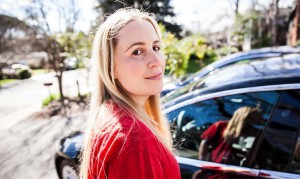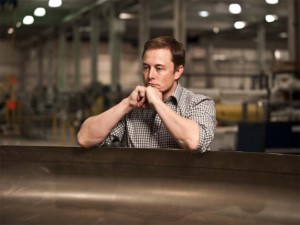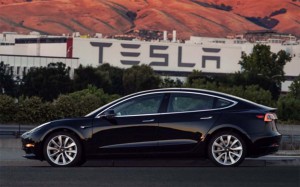
Former Tesla employee AJ Vandermeyden has sued over alleged sexual harassment at the Fremont plant. Photo courtesy The Guardian.
Adding to the list of problems facing Tesla Motors, the automaker is battling a lawsuit filed by former employee A.J. Vandermeyden, who accuses the automaker of tolerating a culture of “pervasive harassment” at its assembly plant in Fremont, California.
That’s the same factory that, just last Friday, produced the first of the automaker’s eagerly awaited Model 3 battery-sedans – and the same factory where a recent report noted Tesla had been experiencing significantly higher injury rates than at assembly plants producing far more vehicles.
In a report by the Guardian newspaper, the 33-year-old Vandermeyden opened up about why she was suing Tesla for sexual harassment after being fired from her job in Fremont. The paper outlined conditions that many employees described during a Tesla town hall meeting earlier this year as a “predator zone,” where, they charged, female workers were open targets for male bosses.
(Tesla rolls the first “saleable” Model 3 out of its Fremont plant. Click Here for the latest.)
For its part, Tesla has downplayed reports of worker safety issues the company insists it has already addressed – while actively countering Vandermeyden’s lawsuit, insisting it is a “miscarriage of justice,” and explaining its position that the former production team member was let go because she was “falsely attacking our company in the press.”
“They just want to absolutely crush anyone who speaks up,” Vandermeyden said, during an interview in San Francisco with the Guardian. “I spoke up, and I was made a sacrificial lamb for it. It’s a scary precedent.”
The newspaper said more than 100 people attended the March town hall meeting, with at least 20 women openly expressing their concerns about harassment, limited diversity programs and the lack of women in managerial positions.
In a lengthy article including its interview with Vandermeyden, the paper reported that, “One female manager, who was present but no longer works for Tesla, told the Guardian she was offended by that comment: ‘It’s insulting. You shouldn’t have to have daughters to know this.’ She said executives’ responses to questions about diversity were generic and filled with corporate jargon.”
(A good week gone bad for Tesla. Click Here to learn what went wrong.)
Tesla has not yet returned a request for comment on the Guardian story by TheDetroitBureau.com. According to the newspaper, the carmaker disputed the Guardian’s characterization of the March meeting and insisted that it subsequently sent out a notification to managers of its “strict policy against any kind of harassment.”
In her lawsuit Vandermeyden notes she was hired by Tesla in 2013 and was subsequently promoted to a manufacturing engineering position. But she claims she and other women in the factory received lower pay than men in similar roles, often despite having superior qualifications. She also claims she was targeted for harassment after speaking out. She went public in February, a month before the town hall meeting.
In May, Tesla hired its first c-suite female executive, Gaby Toledano, to oversee human relations. One of her first moves was to fire Vandermeyden.
“I’m the one who spoke up, and they’re saying, ‘One way or another, you have to leave.’ How is that right?” Vandermeyden said during her interview.
For his part, Musk responded to the Guardian without directly mentioning his former employee, but the subject seemed obvious.
“If you are part of a less represented group, you don’t get a free pass on being a jerk yourself,” he wrote. “We have had a few cases at Tesla where someone in a less represented group was actually given a job or promoted over more qualified highly represented candidates and then decided to sue Tesla for millions of dollars because they felt they weren’t promoted enough. That is obviously not cool.”
Tesla is just one of a number of Silicon Valley firms that have faced harsh accusations of sexual harassment. Similar allegations rocked ride-sharing giant Uber, ultimately contributing to the forced ouster of founder and CEO Travis Kalanick. A new study released this past week charged that the macho “bro culture” found in the Valley has led many talented women to choose not to seek employment there.
(Click Here for the full story on Uber’s own mess, and Kalanick’s departure.)



“I had to, like, pick up this big wrench or whatever and, like, put it on this screw thingy, like every 2 minutes. It was so loud it scared me. Is that any way to, like, treat a lady? And the cars would, like, keep moving all day long. So I missed a few screws during the day, isn’t that why there are soooo many other people there?”
Uh, are we being a little (a lot) misogynist?